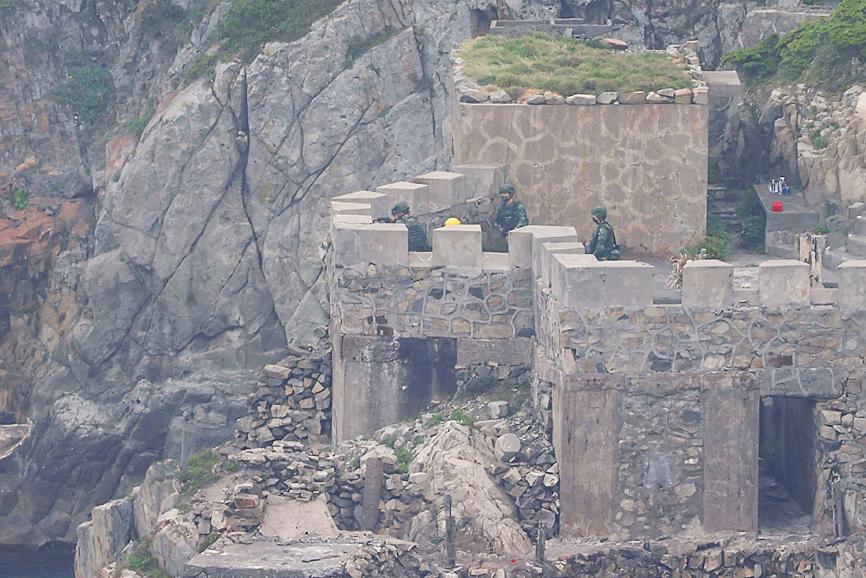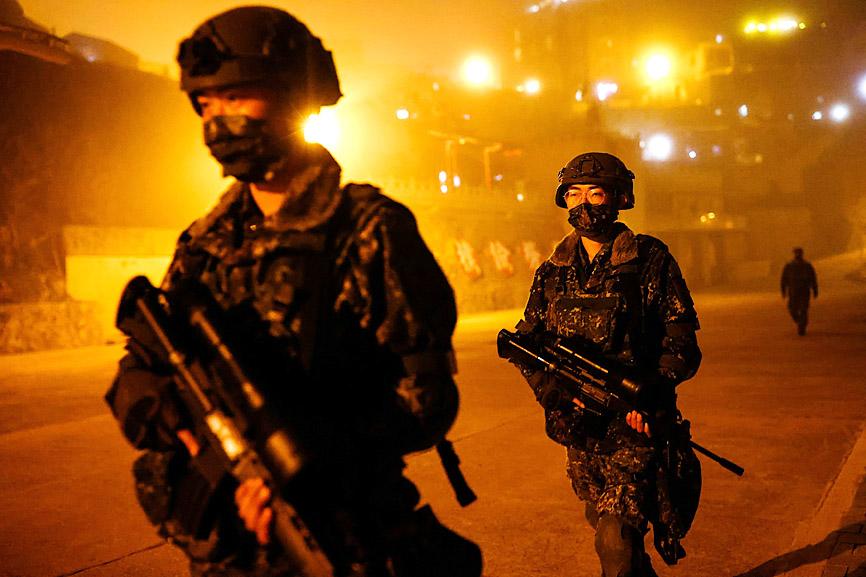Taiwan yesterday held live-fire drills in its northernmost territory, putting the spotlight on a remote island that is strategically located at a choke point near China — and potentially vulnerable to attack.
Although the Ministry of National Defense says the exercises on Dongyin Island (東引), part of the Taiwan-controlled Matsu Islands off the coast of Fuzhou, China, are routine, they are happening as Taipei has raised its alert level after Russia’s invasion of Ukraine, wary of Beijing making a similar move.
Soldiers fired shells at a floating red cross in the water, meant to represent advancing enemy forces. Piercing the calm blue sea, each shell sent spray upwards.

Photo: Ann Wang, Reuters
The echoes of machine guns, punctuated by cannon fire, reverberated around the rugged coastline.
Although Taiwan has not reported any unusual activities by Beijing since the Ukraine war began, on Feb. 5, a small, propeller-driven Chinese aircraft flew very close to Dongyin. The highly unusual event thrust the normally sleepy islet into the headlines.
Taiwan said it suspected China was deploying a civilian aircraft to test its military’s responses.

Photo: Ann Wang, Reuters
Taiwan does not publish details of its military presence there, but the Dongyin Area Command has been at the front line of Taiwan’s defenses since the 1950s.
Dongyin’s forces are equipped with Taiwan’s self-made Hsiung Feng II anti-ship missiles, as well as Sky Bow II surface-to-air missiles, making it “the most strategically important” outlying island, said Chieh Chung (揭仲), an associate research fellow at the National Policy Foundation think tank.
Rocky Dongyin, reached by overnight boat from the Port of Keelung in Taiwan’s north and home to about 1,500 civilians, sits on an important passage for any southbound Chinese forces traveling from eastern Zhejiang Province if they were to attack Taiwan.
“That’s why Dongyin is equipped with the Hsiung Feng and Sky Bow missiles. Dongyin poses a very direct threat to the Chinese communists’ air and naval movements,” Chieh said.
At a seminar in Taipei last month simulating a Chinese attack on Taiwan, retired navy rear admiral Tan Chih-lung (淡志隆) said that Dongyin’s missile sites would be among the first targets of a Chinese attack.
“The People’s Liberation Army for sure would go destroy the Hsiung Feng missile base in Dongyin,” he said. “It is a must-attack.”
A security official familiar with the deployment in Dongyin estimated that there were about 1,100 troops on the island.
“The missile base there is at the very front lines to counter any attack with our missiles. If not for that, why would we value such a small place where the port is too small for bigger military ships and where there is no airport for the air force?” said the official, who declined to be named because of the sensitivity of the matter.
A second security source said that the Chinese aircraft that got close to Dongyin had highlighted its vulnerability and proved it was of great interest to China.
“It is the key to control of the northern part of the Taiwan Strait,” the source added.
Despite the presence of troops, Dongyin is not a closed island. Tourists can explore former military tunnels, take in the stark natural beauty and go fishing.
“We are very used to these sounds,” said Dongyin Township Mayor Lin Te-chien (林德建), as he observed yesterday’s drills.
Minister of National Defense Chiu Kuo-cheng (邱國正) told lawmakers this month that China could draw lessons from the war in Ukraine and “speed up” the pace of any assault on Taiwan, perhaps attacking its outlying islands, while at the same time launching precision missile strikes on targets in Taiwan and sending troops across the Taiwan Strait.
China now has the capacity to take Kinmen and other outlying islands, Chiu said.
“But why have they not done it?” he asked. “Because they want to make sure that they can settle everything with one strike.”

A magnitude 4.9 earthquake struck off Tainan at 11:47am today, the Central Weather Administration (CWA) said. The hypocenter was 32.3km northeast of Tainan City Hall at a depth of 7.3km, CWA data showed. The intensity of the quake, which gauges the actual effect of a seismic event, measured 4 in Tainan and Chiayi County on Taiwan's seven-tier intensity scale, the data showed. The quake had an intensity of 3 in Chiayi City and County, and Yunlin County, while it was measured as 2 in Kaohsiung, Nantou County, Changhua County, Taitung County and offshore Penghu County, the data showed. There were no immediate reports of

‘DENIAL DEFENSE’: The US would increase its military presence with uncrewed ships, and submarines, while boosting defense in the Indo-Pacific, a Pete Hegseth memo said The US is reorienting its military strategy to focus primarily on deterring a potential Chinese invasion of Taiwan, a memo signed by US Secretary of Defense Pete Hegseth showed. The memo also called on Taiwan to increase its defense spending. The document, known as the “Interim National Defense Strategic Guidance,” was distributed this month and detailed the national defense plans of US President Donald Trump’s administration, an article in the Washington Post said on Saturday. It outlines how the US can prepare for a potential war with China and defend itself from threats in the “near abroad,” including Greenland and the Panama

The Chinese Nationalist Party (KMT) is maintaining close ties with Beijing, the Democratic Progressive Party (DPP) said yesterday, hours after a new round of Chinese military drills in the Taiwan Strait began. Political parties in a democracy have a responsibility to be loyal to the nation and defend its sovereignty, DPP spokesman Justin Wu (吳崢) told a news conference in Taipei. His comments came hours after Beijing announced via Chinese state media that the Chinese People’s Liberation Army’s Eastern Theater Command was holding large-scale drills simulating a multi-pronged attack on Taiwan. Contrary to the KMT’s claims that it is staunchly anti-communist, KMT Deputy

RESPONSE: The government would investigate incidents of Taiwanese entertainers in China promoting CCP propaganda online in contravention of the law, the source said Taiwanese entertainers living in China who are found to have contravened cross-strait regulations or collaborated with the Chinese Communist Party (CCP) could be subject to fines, a source said on Sunday. Several Taiwanese entertainers have posted on the social media platform Sina Weibo saying that Taiwan “must be returned” to China, and sharing news articles from Chinese state media. In response, the Mainland Affairs Council (MAC) has asked the Ministry of Culture to investigate whether the entertainers had contravened any laws, and asked for them to be questioned upon their return to Taiwan, an official familiar with the matter said. To curb repeated